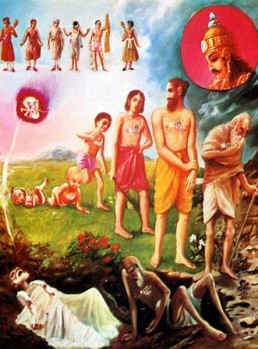Swami Chinmayananda Commentary
The Eternal Absolute is explained to us as Infinite, All-knowing and All-blissful. Our experience of ourselves is that we are finite, ignorant and miserable. Thus, between the Reality, which is our Self, and what we experience ourselves to be, there seems to be as much difference as between heat and cold, light and darkness. Why is it that we are not able to recognise the Self, which is our Real Nature?
In our ignorance, when we try to perceive the Truth, it seems to be a goal to be reached at some distant place, in a distant period of time. But in fact, if we are to believe the Lord’s words, the Self being our essential nature, we are never far from It. A mortal is as far away from Immortality — the sinner is as far removed from a Saint — the imperfect is as far removed from Perfection — as a dreamer is from the waker.
Man awakened to the Self’s Glory is God; God forgetful of His own glory is the deluded man!
To the ego, the very existence of the subtler Self beyond the body, mind and intellect is an idea that cannot even be conceived of, and, when a mortal, through the techniques of self-perfection, comes to recognise himself to be the Self, he is struck with a wondrous ecstasy of that supra-sensuous experience.
The emotion of wonder, when it rises in the mind, has the capacity to black-out, for the time being, all cognitions, and the individual who has been struck with wonder, forgets himself and becomes, for the moment, one with the very emotion. As an experiment, try to completely surprise somebody, and quietly watch his attitude. With mouth open and his unseeing eyes protruding out, every nerve in him stretched to the highest tension, the victim-of-wonderment stands fixed to the spot as a statue carved in moist, cold, flesh. The same is the thrilled hush of lived joy in the Temple of Experience, when the Self, all alone with the Self, comes to live as the Self. And, therefore, the great Rishis of old borrowed the term ‘wonderment’ to indicate to the student what exactly would be the condition of his personality layers at the moment when his ego drops off from the resplendent Infinite Form of the Self.
True knowledge makes a man realise that he is “The Soul with a body,” but now in his ignorance, he thinks that he is a “body with a soul.” Those who LISTEN well are encouraged to REFLECT on what they have heard and to MEDITATE until they realise the Self. The unintelligent listeners also feel encouraged, by the very same statement expressing the rarity of this knowledge, to make repeated attempts at listening (shravana), continuous reflection (manana) and long contemplation (nididhyasana).
HERE THE LORD CONCLUDES THE SUBJECT OF THIS SECTION, THUS:
Adi Sankara Commentary
‘This Self under discussion is inscrutable. Why should I blame you alone regarding a thing that is a source of delusion to all!’ How is this Self inscrutable? [It may be argued that the Self is the object of egoism. The answer is: Although the individualized Self is the object of egoism, the absolute Self is not.] This is being answered in, ‘Someone visualizes It as a wonder,’ etc. Kascit, someone; pasyati, visualizes; enam, It, the Self; ascaryavat, as a wonder, as though It were a wonder — a wonder is something not seen before, something strange, something seen all on a sudden; what is comparable to that is ascarya-vat; ca, and; tatha, similarly; eva, indeed; kascit, someone; anyah, else; vadati, talks of It as a wonder. And someone else srnoti, hears of It as a wonder. And someone, indeed, na, does not; veda, realize It; api, even; srutva, after hearing, seeing and speaking about It. Or, (the meaning is) he who sees the Self is like a wonder. He who speaks of It and the who hears of It is indeed rare among many thousands. Therefore, the idea is that the Self is difficult to understand. Now, in the course of concluding the topic under discussion, [viz the needlessness of sorrow and delusion,from the point of view of the nature of things.] He says, ‘O descendant of Bharata, this embodied Self’, etc.
The Bhagavad Gita with the commentary of Sri Sankaracharya – Translated by Alladi Mahadeva Sastry
Holy Geeta – Commentary by Swami Chinmayananda
The Bhagavad Gita by Eknath Easwaran – Best selling translation of the Bhagavad Gita
The Bhagavad Gita – Translation and Commentary by Swami Sivananda
Bhagavad Gita – Translation and Commentary by Bhaktivedanta Swami Prabupadha
Srimad Bhagavad Gita Chapter 2 – Verse 29 – 2.29 ashcharya – All Bhagavad Gita (Geeta) Verses in Sanskrit, English, Transliteration, Word Meaning, Translation, Audio, Shankara Bhashya, Adi Sankaracharya Commentary and Links to Videos by Swami Chinmayananda and others – 2-29

